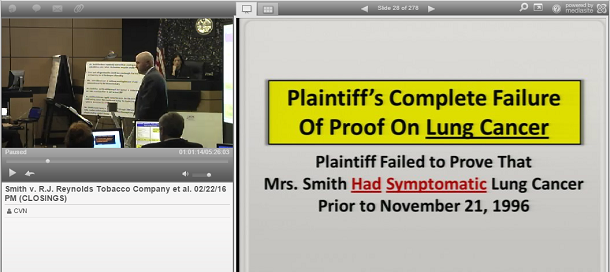
Jason Keehfus delivers the closing argument on behalf of R.J. Reynolds in Elizabeth Smith's suit against Reynolds and Philip Morris. Jurors Monday found her claimed smoking-related diseases did not develop within the time allowed for membership in a class action against the companies.
West Palm Beach, FL—A jury Monday concluded a Florida woman did not have cancer or respiratory disease within the time required for membership in a class action against the nation’s tobacco companies, clearing Philip Morris and R.J. Reynolds of liability in her suit. Smith v. R.J. Reynolds Tobacco Co., et al., 2007-CA-023930.
Jurors took only an hour to find Elizabeth Smith’s cancer and chronic obstructive pulmonary disease did not develop before November 21, 1996, the cutoff date for membership in Engle v. Liggett Group, a 1994 class action suit involving Florida smokers.
Smith, 66, tried her first cigarette at 10 years old while growing up in a rural area of Tennessee. She has subsequently smoked up to three packs of cigarettes a day for more than 50 years. She claims she has been unable to stop smoking, despite numerous quit attempts, lung cancer surgery in 1997, and chronic obstructive pulmonary disease, or COPD, that affects her breathing. Smith contends Reynolds and Philip Morris caused her nicotine addiction, and various smoking-related diseases by concealing the addictiveness and dangers of cigarettes through much of the 20th century.
During Monday’s closing arguments, Smith’s attorney, The Whittemore Law Group’s Kent Whittemore, requested more than $3.1 million in compensatory damages, plus unspecified punitives.
Smith’s case is one of thousands of so-called “progeny” claims stemming from the original Engle class action. A jury in the original case found tobacco companies knowingly produced dangerous, addictive cigarettes and hid those dangers from the public. The Florida Supreme Court decertified the class on appeal, but its ruling allows individual plaintiffs to rely on the jury’s conclusions in the original trial if they can prove the smokers at the center of their cases suffered from nicotine addiction and a smoking-related disease that “manifested” itself before November 21, 1996.
The cutoff date proved a focal point of the case, with both sides sparring over evidence of when Smith's diseases developed.
Smith’s attorneys argued Smith suffered from tell-tale symptoms of COPD long before the 1996 cutoff, while the size of her cancer in 1997 rendered it likely she had the disease for at least a year before doctors discovered it.
During Monday’s closing arguments, Smith’s attorney, Howard Acosta, of The Law Offices of Howard M. Acosta, told jurors evidence proved Smith had a productive cough and “chronic bronchitis” as far back as 1994, which, at that time, was considered COPD without further testing. “That was the way the diagnosis (of COPD) worked back before 1996,” Acosta said.
Acosta reminded jurors Dr. Allan Goldman, a pulmonologist who examined Smith’s records but did not treat her, testified that he was “sure” Smith had cancer before the 1996 cutoff date. Acosta acknowledged Smith’s cancer was a sphere the size of a dime when doctors found it in 1997. However, “It takes awhile for (a cancer like Smith’s) to develop (to that size),” Acosta said.
The defense countered by highlighting the lack of a definitive documented diagnosis of either disease prior to the cutoff date. During Monday’s closings, King & Spalding's Jason Keehfus argued none of Smith’s treating physicians indicated Smith suffered from either disease before November 1996. “She saw at least 14 different physicians (between 1997 and 2002). Different specialties, different offices, different record-keeping practices, different nurses,” Keehfus said. “Not a single one mentioned Mrs. Smith had serious diseases like COPD or lung cancer prior to November 21, 1996. Because she didn’t.”
Keehfus also noted Smith’s pulmonary function tests, which are now used to diagnose COPD, were normal until either 2002 or 2010. “Whether it’s 2002 or 2010, what plaintiff would have you believe is that Mrs. Smith had COPD prior to November 21, 1996 and that her doctors somehow missed it for eight years or 14 years, until they actually diagnosed it,” Keehfus said. “Respectfully, that doesn’t make much sense. That didn’t happen.”
Email Arlin Crisco at acrisco@cvn.com.
Related information:
Elizabeth and Robert Smith are presented by Howard Acosta, of The Law Offices of Howard M. Acosta, and Kent Whittemore, of the Whittemore Law Group, P.A.
R.J. Reynolds is represented by King & Spalding's W. Ray Persons and Jason Keehfus.
Philip Morris is represented by Shook Hardy's David Thorne.
Watch gavel-to-gavel video of the case on demand.
Not a subscriber?
Learn more about CVN's unrivaled tobacco litigation library.





